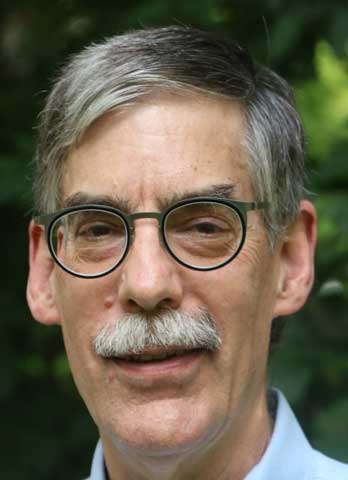
Compositions by Michael Eckert
The Center for New Music Ensemble
Sunday, September 23, 2018 at 7:30p in the Concert Hall
Program
Point of No Return (2003) |
Michael ECKERT (b. 1950) |
Ana Maria Locke, clarinet
Peter Naughton, percussion
Nicha Pimthong, piano
Yixue Zhang, violin
Hui-Hsuan Su, violoncello
David Gompper, conductor
Blue Arc (2009)
Nicha Pimthong, piano
Duo (1978)
II. Molto sostenuto
Nicha Pimthong, piano
Intermission
To Daffodils (2018)
Dr. Timothy Stalter, conductor
Sopranos
Ericka Barloon, Anika Kildegaard, Calli Lowry, Roshni Nair, Kristin Ramseyer, Tiani Swallow
Altos
Emma Gostonczik, Kelly Hill, Wen Chin Liu, Ella Schmitz, Emily Wheeler
Tenors
Will Adams, Connor Ensign, Juan Carlos Mendoza, Mason Montuoro, Ben Owen, Colin Wilson
Basses
Conor Broaders, Erik Doucette, Josh Edmond, Brandon Garcia, Grant Lyons, Tristan Miedema, Jack Simpson
Wind Quintet (2006)
II. Andante comodo
III. Allegretto scherzando
Mauricio Silva, clarinet
Jenna Sehmann, oboe
Shawn Seguin, bassoon
Komsun Dilokkunanant, horn
Three Pieces in Brazilian Style (2007)
II. Waltz
III. Chôro in C
Rene Lecuona, piano
Program Notes
Michael Eckert
Point of No Return
Composed between November 2002 and February 2003, Point of No Return is a single movement lasting around nine minutes. The title alludes to the absence of literal repetition in the music, and also to the space shuttle Columbia crash on February 1, 2003. Point of No Return was first performed UI Center for New Music, conducted by Amelia Kaplan, on April 6, 2003, and is recorded on Monsterology: New Music from Iowa, Albany TROY900 (2007).
Blue Arc
Blue Arc is a seven-minute piece for alto saxophone and piano, written in 2009 for Kenneth Tse, who first played it in March 2012 on a faculty recital at the School of Music.
Duo
Duo for flute/alto flute and piano was written in the summer of 1978 in New Orleans. The pitch structure of the first movement is freely atonal; that of the second is strict, based on the twelve-note series in the opening alto flute melody. The second movement concludes with a two-voice canon in contrary motion whose second phrase cites the opening of the first movement.
To Daffodils
In 2005 I composed Echo’s Song on a text by Ben Johnson (1572-1637) for Timothy Stalter and the UI Kantorei. As Johnson’s poem concludes “Since nature’s pride is now a withered daffodil,” this new work represents a long-delayed re-engagement with the beautiful sonic material offered by mixed voices, using another 17th-century poet’s treatment of daffodils as a symbol for transience. It is somewhat daunting that the list of English composers who have set To Daffodils for voices includes Arthur Sullivan, Roger Quilter, Ernest Moeran, Harold Darke, Frank Bridge, and Benjamin Britten. My setting is something of an exercise in text-painting, with “madrigalisms” inspired by both Renaissance and Baroque music, but in a variety of harmonic idioms. For example, the chromaticism of “As yet the early-rising sun / Has not attain’d his noon” was suggested by the opening of Luca Marenzio’s setting of Petrarch’s sonnet Solo e Pensoso, but the harmonic language is 20th-century.
Wind Quintet
Wind Quintet was written during the summer of 2006 in commemoration of the 100th anniversary of the UI School of Music. The Iowa Woodwind Quintet (Gro Sandvik, Mark Weiger, Maurita Mead, Kristin Thelander, and Benjamin Coelho) gave the first performance on October 18, 2006 in Hancher Auditorium. Lasting about twelve minutes, the three movements progress in tempo from slow to fast. The third movement is a reworking of Chaser, a 1997 piece for flute, oboe, horn and piano.
Three Pieces in Brazilian Style
Three Pieces in Brazilian Style (2007) is the second of four sets of pieces in chôro style for clarinet and piano I wrote between 2006 and 2010. Chôro is a genre of Brazilian popular music based on instrumental ensemble improvisation, within the formal structure of late 19th-century dances such as the polka and waltz; I first encountered it through recordings of the piano music of Ernesto Nazareth (1863-1934). Maurita Mead and Diego Arango premiered the piece in February 2008 in a faculty recital in Clapp Recital Hall.